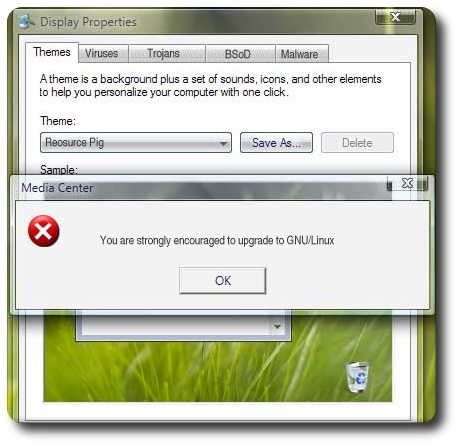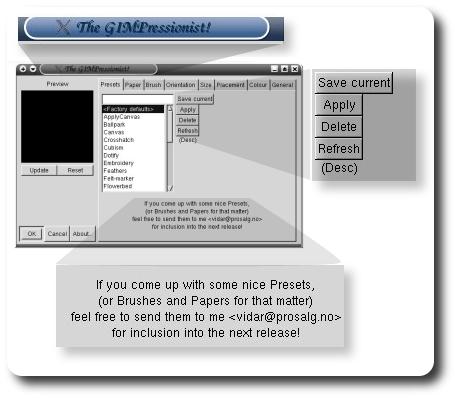
I learned to love the mockup that I had prepared with
the GNU Image Manipulation Program (GIMP) last month
 TEREOTYPES are hard to fight, but logical inclinations are even harder to change. Everyone wishes to push away the enemy, whatever or whoever that enemy may be. First they ignore, then they ridicule and laugh at the enemy. Finally, they fight, before inevitably conceding and losing (attribution: Ghandi was among some people to use this 4-step breakdown, but he was not necessarily the first).
TEREOTYPES are hard to fight, but logical inclinations are even harder to change. Everyone wishes to push away the enemy, whatever or whoever that enemy may be. First they ignore, then they ridicule and laugh at the enemy. Finally, they fight, before inevitably conceding and losing (attribution: Ghandi was among some people to use this 4-step breakdown, but he was not necessarily the first).
What point am I approaching here? Nobody likes foreseeing change. Change can leave one behind. Windows-defending ‘Internet trolls’ , and Windows advocates alike, fear becoming newbies so they will utter “Linux is terrible, hard, not ready for the desktop and so forth”. Maybe if they push it hard enough, they believe, one can win time for Microsoft to catch up, yet they most probably will not. This commotion has the adverse effect. The sooner people upgrade to Linux, the better. The world is heading towards open standards, Open Source, and one vocation that is opened by such migration — the Free Open Source: GNU/Linux.
As I said once in the past, I do not perceive myself as a typical, largely-ridiculed ‘Linux fanboy’. What I do appears to be constructive and beneficial for society’s computing infrastructure, as well as for quicker innovation in science and technology.
In recent months I have had the pleasure of sending Pamela Jones some news items on a daily basis. What a nice person she is! This morning I decided to learn a little more about her (non-personal) background and the following interview caught my mind (only a fragment appears beneath). I believe it supports the main point that I address above, as well as my previous post from yesterday.
(PJ:) They were always getting viruses and other malware, and eventually I learned why and how and what to do (not that they cooperated much), and one day I realized, “I really love this stuff.” When I discovered dual booting or a Knoppix CD meant you could see what went wrong on the Windows side, it changed my life. Eventually, I couldn’t enjoy Windows any more, partly because I saw finally there really was no way to secure a Windows 98 box no matter what you do, and partly because upgrading beyond Windows 2000 meant licenses to choke on, a lot because of privacy concerns, and also because I started resenting typing in numbers to prove I had paid for the software and feeling like I was being treated like I was criminally-inclined. The difference in how I felt using the two OSs was striking.
One day, I realized that this difference was “It”. Proprietary software and all the laws that back it up are designed to enforce restrictions on users. And that’s just what it felt like. For personal pleasure, I always turned to GNU/Linux, which felt like breathing clean air. No restrictions.
 NLY a year ago, before ODF became the ISO standard, I had to engage in lengthy and complex arguments over formats. I was doing fine by my own, but the issue of exchange arises in wider public arenas. Not anymore though. The crowning of ODF gives all the protection that I require. Here is an anonymised E-mail that I have just sent.
NLY a year ago, before ODF became the ISO standard, I had to engage in lengthy and complex arguments over formats. I was doing fine by my own, but the issue of exchange arises in wider public arenas. Not anymore though. The crowning of ODF gives all the protection that I require. Here is an anonymised E-mail that I have just sent.





 Filed under:
Filed under: 
 Net neutrality is somewhat similar to the closing of software in the eighties. It involves greedy corporations that observe somethings open with financial potential, as well as benefits to be reaped. They introduce restrictions and kill openness to serve interests and agendas.
Net neutrality is somewhat similar to the closing of software in the eighties. It involves greedy corporations that observe somethings open with financial potential, as well as benefits to be reaped. They introduce restrictions and kill openness to serve interests and agendas.
 TEREOTYPES are hard to fight, but logical inclinations are even harder to change. Everyone wishes to push away the enemy, whatever or whoever that enemy may be. First they ignore, then they ridicule and laugh at the enemy. Finally, they fight, before inevitably conceding and losing (attribution: Ghandi was among some people to use this 4-step breakdown, but he was not necessarily the first).
TEREOTYPES are hard to fight, but logical inclinations are even harder to change. Everyone wishes to push away the enemy, whatever or whoever that enemy may be. First they ignore, then they ridicule and laugh at the enemy. Finally, they fight, before inevitably conceding and losing (attribution: Ghandi was among some people to use this 4-step breakdown, but he was not necessarily the first).
 quite enjoy my life in an arena which involves research, publications, public appearances, sharing of code that I produce, and technical writings that I rapidly accumulate. All of that, in fact, is something that reaches culmination through the Internet and Web sites, which are — to me at least — a gateway to a wider world. For long I have pondered (and even lost sleep over) a scenario where I find myself in a cubicle, coding for somebody else day, by day, by day…
quite enjoy my life in an arena which involves research, publications, public appearances, sharing of code that I produce, and technical writings that I rapidly accumulate. All of that, in fact, is something that reaches culmination through the Internet and Web sites, which are — to me at least — a gateway to a wider world. For long I have pondered (and even lost sleep over) a scenario where I find myself in a cubicle, coding for somebody else day, by day, by day…

 HEN was the last time you revised your résumé? Here comes a personal rant. Explicitly putting in skills such as “Word” and “Photoshop”, rather than “office/authoring/WYSIWYG tools” and “graphical design/editing applications” (respectively), is just plain silly. Competence in industry is about skills that are independent of just one commercial application. Times are changing and preferred software changes in accordance. Businesses evolve. Adaptability and familiarity with diversity is where true merits lie. Common function names and icons can help the user quickly familiarise and re-orientate, so generic skills are what truly counts. Think memorisation of menus versus understanding. The paradigm and terminology, as well as menu layouts, will typically remain uniform, owing to the nature of the task at hand.
HEN was the last time you revised your résumé? Here comes a personal rant. Explicitly putting in skills such as “Word” and “Photoshop”, rather than “office/authoring/WYSIWYG tools” and “graphical design/editing applications” (respectively), is just plain silly. Competence in industry is about skills that are independent of just one commercial application. Times are changing and preferred software changes in accordance. Businesses evolve. Adaptability and familiarity with diversity is where true merits lie. Common function names and icons can help the user quickly familiarise and re-orientate, so generic skills are what truly counts. Think memorisation of menus versus understanding. The paradigm and terminology, as well as menu layouts, will typically remain uniform, owing to the nature of the task at hand.